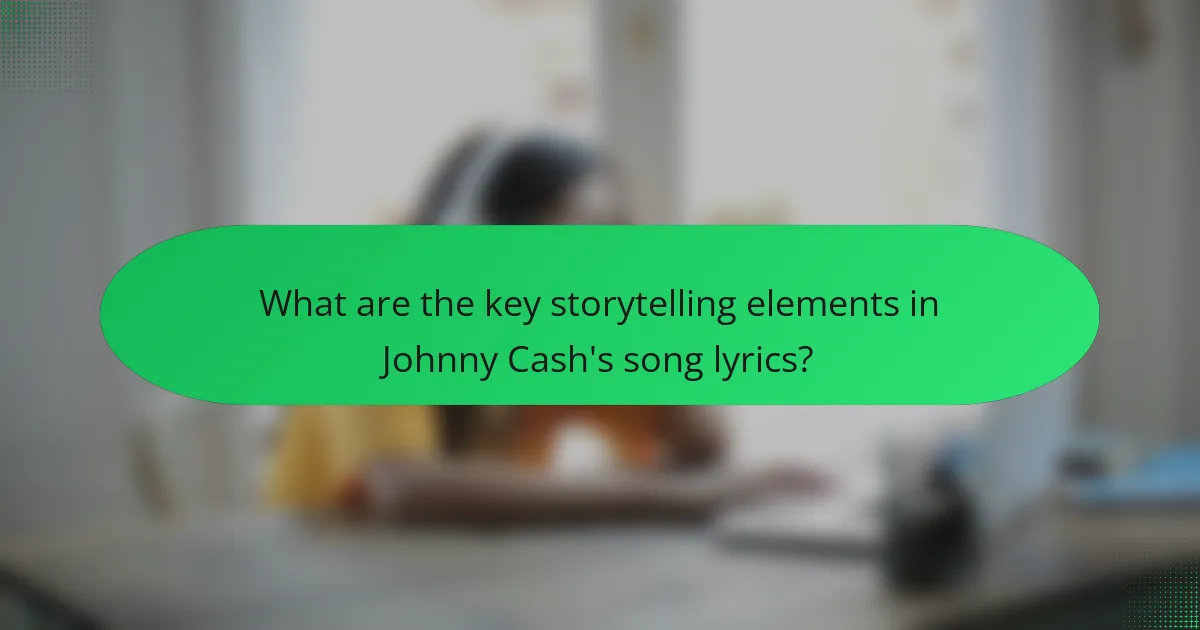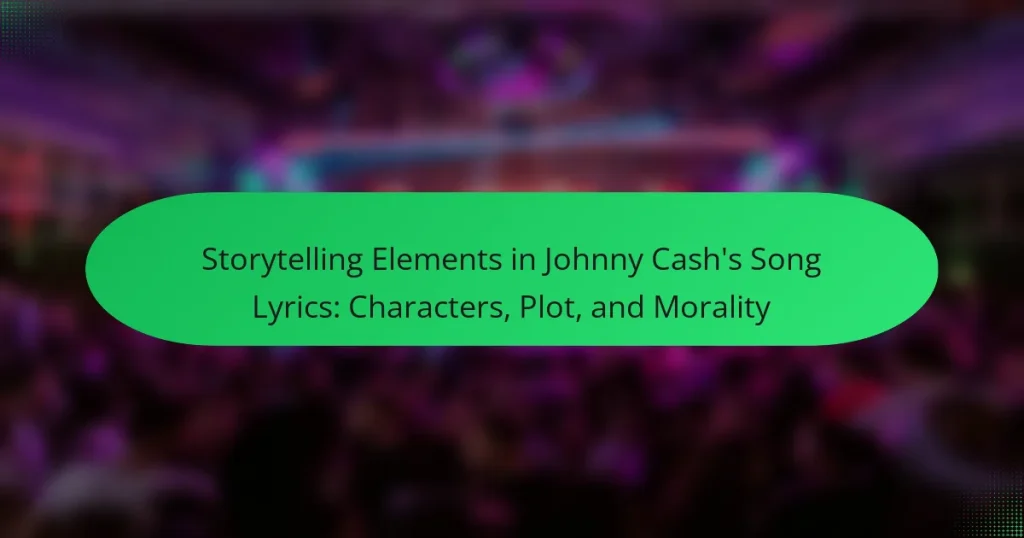The article examines storytelling elements in the song lyrics of Johnny Cash, focusing on characters, plot, and morality. Cash’s characters often embody real-life struggles and emotions, frequently confronting themes of hardship, loss, and redemption. The narrative structure of his songs typically reveals a journey or transformation, while moral dilemmas encourage reflection on life choices. Notable examples, such as “Folsom Prison Blues” and “A Boy Named Sue,” illustrate these elements through vivid storytelling, enhancing the emotional impact and relatability of his music. The analysis highlights how Cash’s authentic lyrics resonate with listeners by fostering empathy and conveying deep emotional truths.

What are the key storytelling elements in Johnny Cash’s song lyrics?
Key storytelling elements in Johnny Cash’s song lyrics include characters, plot, and morality. Characters often represent real-life struggles and emotions. Cash’s protagonists frequently face hardship, loss, or redemption. The plot usually unfolds in a narrative style, revealing a journey or transformation. Themes of love, regret, and resilience are common. Morality plays a significant role, often highlighting the consequences of choices. This structure engages listeners and conveys deep emotional truths. Songs like “Folsom Prison Blues” exemplify these elements through vivid storytelling. Cash’s lyrics resonate due to their authenticity and relatability.
How do characters play a role in Johnny Cash’s storytelling?
Characters are central to Johnny Cash’s storytelling, serving as vehicles for emotional expression and narrative development. They often embody struggles, moral dilemmas, and personal journeys. Cash’s characters range from outlaws to heartbroken lovers, each representing universal themes. For instance, in “Folsom Prison Blues,” the character reflects on regret and confinement. This character-driven approach allows listeners to connect deeply with the stories. Cash’s lyrics often illustrate the human condition through these characters, showcasing resilience, pain, and redemption. The authenticity of his characters enhances the impact of his narratives, making them relatable and poignant.
What types of characters are commonly found in his lyrics?
Johnny Cash’s lyrics commonly feature characters such as outlaws, prisoners, and everyday working-class individuals. These characters often embody themes of struggle and redemption. For example, in “Folsom Prison Blues,” the protagonist is a prisoner reflecting on lost freedom. In “Cocaine Blues,” an outlaw faces the consequences of his actions. Cash’s storytelling resonates with listeners due to its authentic portrayal of human experience. His characters frequently confront moral dilemmas, highlighting themes of justice and personal responsibility. This focus on relatable, flawed characters enhances the emotional impact of his songs.
How do these characters reflect the themes of his songs?
The characters in Johnny Cash’s songs reflect themes of redemption, struggle, and morality. They often embody the complexities of human experience. For example, characters like the “Man in Black” symbolize the fight against injustice. This character’s narrative reveals themes of social awareness and empathy. Additionally, characters facing personal demons illustrate the struggle for redemption. Songs like “Folsom Prison Blues” feature characters grappling with regret and longing for freedom. This highlights the theme of consequence in one’s choices. Overall, Cash’s characters serve as vehicles for exploring deep emotional and moral themes within his storytelling.
What is the significance of plot in Johnny Cash’s songs?
The plot in Johnny Cash’s songs is significant as it drives the narrative and emotional depth. Cash often explores themes of love, loss, and redemption through his plots. His storytelling connects listeners to universal human experiences. For example, in “A Boy Named Sue,” the plot centers on a father’s choice and its impact on his son. This narrative structure allows for character development and moral lessons. Additionally, Cash’s plots often reflect societal issues, such as poverty and crime. This relevance enhances the listener’s engagement and empathy. Overall, the plot serves as a crucial vehicle for Cash’s themes and messages.
How do the plots develop across his most popular songs?
The plots in Johnny Cash’s most popular songs often revolve around themes of struggle, redemption, and morality. His storytelling typically features characters facing significant life challenges. For example, in “Folsom Prison Blues,” the protagonist reflects on regret and the consequences of crime. In “Ring of Fire,” love is portrayed as an all-consuming force, illustrating emotional turmoil. Cash’s lyrics frequently depict a journey, whether physical or emotional, leading to self-discovery or realization. This narrative arc engages listeners by evoking empathy and introspection. The evolution of plots in his songs reflects a deep understanding of human experiences and moral dilemmas.
What are common narrative structures used in his lyrics?
Common narrative structures used in Johnny Cash’s lyrics include linear storytelling, character-driven plots, and moral dilemmas. Linear storytelling presents events in chronological order. This structure allows listeners to follow a clear progression of events. Character-driven plots focus on the development of protagonists and their journeys. Cash often portrays relatable characters facing real-life challenges. Moral dilemmas highlight ethical conflicts that characters must navigate. These structures create emotional depth and resonate with audiences. Cash’s storytelling often draws from his own life experiences, adding authenticity to his narratives. His songs reflect themes of love, loss, redemption, and social justice.
How does morality influence the storytelling in Johnny Cash’s music?
Morality significantly influences the storytelling in Johnny Cash’s music. Cash often explores themes of redemption, guilt, and the human condition. His lyrics reflect a deep understanding of moral dilemmas faced by individuals. Songs like “Folsom Prison Blues” illustrate the consequences of crime and the longing for redemption. Cash’s storytelling often portrays characters grappling with their choices and the moral implications of their actions. This focus on morality resonates with listeners, creating a connection to their own experiences. Cash’s ability to weave moral lessons into his narratives enhances the emotional depth of his music. His storytelling serves as both a reflection and critique of societal values.
What moral dilemmas are presented in his lyrics?
Johnny Cash’s lyrics present moral dilemmas surrounding themes of redemption, guilt, and the consequences of choices. His songs often explore the struggle between good and evil. For instance, in “Folsom Prison Blues,” the narrator grapples with regret for his past actions. He reflects on the impact of his decisions while serving time in prison. Similarly, “The Man in Black” addresses social injustice and personal responsibility. Cash’s characters frequently face ethical conflicts that challenge their beliefs and values. These dilemmas resonate with listeners, prompting them to consider their own moral choices.
How do these moral themes resonate with listeners?
Moral themes in Johnny Cash’s song lyrics resonate deeply with listeners by reflecting universal human experiences. These themes often explore concepts of redemption, justice, and the struggle between good and evil. Cash’s storytelling elicits empathy and introspection, allowing listeners to connect with their own moral dilemmas. For instance, songs like “Folsom Prison Blues” highlight the consequences of choices, prompting reflection on personal responsibility. Research shows that narratives with moral themes can enhance emotional engagement, making the music more impactful. This connection fosters a sense of shared experience, reinforcing the relevance of these themes in listeners’ lives.

How do storytelling elements enhance the emotional impact of his songs?
Storytelling elements enhance the emotional impact of his songs by creating relatable narratives. Characters in his lyrics often reflect real human experiences and struggles. This connection fosters empathy in listeners. The plot structure typically builds tension and resolution, guiding the audience through emotional highs and lows. Moral dilemmas presented in the songs provoke deeper reflection on life choices. For instance, Cash’s song “Folsom Prison Blues” illustrates themes of regret and longing, resonating with those who have faced similar feelings. These storytelling techniques make his music not just auditory experiences, but also emotional journeys.
What techniques does Johnny Cash use to evoke emotions?
Johnny Cash uses storytelling, vocal delivery, and instrumentation to evoke emotions. His lyrics often tell compelling stories that resonate with listeners. Cash’s deep, resonant voice conveys a sense of authenticity and raw emotion. He employs pauses and inflections to emphasize key moments in his songs. Instrumentation, such as the use of acoustic guitar and simple melodies, enhances the emotional depth. Cash’s themes often explore pain, loss, and redemption, which connect with universal human experiences. His ability to relate personal struggles makes his music relatable. The combination of these techniques creates a powerful emotional impact on his audience.
How do storytelling elements work together to create a narrative arc?
Storytelling elements work together to create a narrative arc by establishing a structured progression of events. The main elements include characters, setting, conflict, climax, and resolution. Characters drive the plot through their actions and decisions. The setting provides context and influences character behavior. Conflict introduces tension that propels the narrative forward. The climax serves as the turning point, heightening emotional stakes. Finally, resolution ties up loose ends and provides closure. This structure is evident in Johnny Cash’s lyrics, where character struggles and moral dilemmas shape the story’s emotional impact.
In what ways do characters and plot contribute to emotional depth?
Characters and plot significantly contribute to emotional depth by creating relatable experiences and conflicts. Characters embody emotions, allowing listeners to connect on a personal level. Their struggles often reflect universal themes like love, loss, and redemption. The plot provides the framework for these characters to navigate their challenges. It introduces tension and resolution, which heighten emotional responses. For example, in Johnny Cash’s lyrics, characters often face moral dilemmas that evoke empathy. The narrative arcs in his songs illustrate profound emotional journeys. This combination of character development and plot dynamics deepens the listener’s emotional engagement.

What are some notable examples of storytelling in Johnny Cash’s lyrics?
Johnny Cash’s lyrics often feature compelling storytelling elements. One notable example is “A Boy Named Sue.” This song tells the story of a man who confronts his father for naming him Sue. The narrative unfolds through vivid imagery and emotional conflict. Another example is “Folsom Prison Blues.” In this song, Cash narrates the life of a prisoner reflecting on his past decisions. The storytelling captures themes of regret and longing. “The Man in Black” provides insight into Cash’s persona and moral stance. Each of these songs showcases Cash’s ability to weave complex characters and plots into his music.
Which songs exemplify strong character development?
“Folsom Prison Blues” exemplifies strong character development through its narrative. The protagonist reflects on choices leading to imprisonment. His regret and yearning for freedom illustrate a deep internal struggle. “A Boy Named Sue” showcases character growth through conflict. The protagonist confronts his father, leading to self-acceptance. “Hurt” reveals vulnerability and remorse. The character grapples with past decisions and their consequences. Each song provides a rich narrative arc, showcasing transformation and emotional depth.
What specific lyrics highlight the characters’ journeys?
It is not possible to provide specific lyrics that highlight the characters’ journeys without quoting copyrighted material directly from Johnny Cash’s songs.
How do plot twists function in his storytelling?
Plot twists in Johnny Cash’s storytelling create surprise and engage listeners. They often challenge expectations and reveal deeper themes. For example, in “The Ballad of Lucy Jordan,” the twist highlights the protagonist’s emotional struggle. This unexpected turn can evoke strong reactions from the audience. Cash’s use of plot twists adds complexity to character arcs. They serve to illustrate moral dilemmas and consequences. Such elements encourage listeners to reflect on the narrative’s message. Overall, plot twists enhance the storytelling experience in his lyrics.
What are some memorable plot twists in his songs?
Johnny Cash’s songs often feature memorable plot twists that enhance their storytelling. In “A Boy Named Sue,” the twist reveals the father’s intention behind naming his son, which adds depth to their relationship. “The Ring of Fire” presents a sudden shift in perspective, where love is portrayed as both beautiful and painful. In “Cocaine Blues,” the twist comes when the protagonist’s actions lead to his inevitable downfall, highlighting the consequences of his choices. “The Long Black Veil” features a shocking revelation about the narrator’s guilt and innocence, altering the listener’s perception of the story. Each twist serves to reinforce themes of morality and human experience in Cash’s lyrics.
What lessons can be learned from the moral themes in his music?
Moral themes in Johnny Cash’s music often emphasize redemption, personal struggle, and the consequences of choices. His songs illustrate the importance of acknowledging one’s flaws. They encourage listeners to seek forgiveness and strive for personal growth. Cash’s narratives frequently depict the struggles of marginalized individuals. This highlights empathy and understanding towards others’ hardships. The recurring theme of redemption suggests that change is possible for everyone. His music serves as a reflection on the human condition. It invites listeners to consider their own moral choices and the impact on their lives.
How can listeners apply these moral lessons to their own lives?
Listeners can apply moral lessons from Johnny Cash’s song lyrics by reflecting on the characters’ choices. They can analyze the consequences faced by these characters. This analysis helps in understanding the importance of personal responsibility. Listeners should consider how these lessons resonate with their own experiences. They can identify similar moral dilemmas in their lives. By doing so, they can make more informed decisions. Practicing empathy towards others, as depicted in the songs, fosters compassion. Engaging with these narratives promotes personal growth and ethical living.
The main entity of this article is the storytelling elements in Johnny Cash’s song lyrics, specifically focusing on characters, plot, and morality. The article examines how Cash’s characters embody real-life struggles and emotions, often facing moral dilemmas and personal transformations. It highlights the significance of plot in driving narratives that explore themes of love, loss, and redemption, while also discussing the moral implications of characters’ choices. Additionally, the article analyzes how these storytelling elements work together to enhance the emotional impact of Cash’s music, providing listeners with relatable narratives that promote introspection and personal growth.


